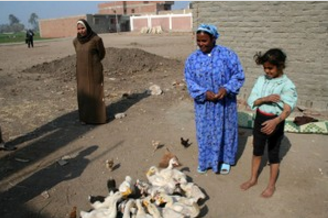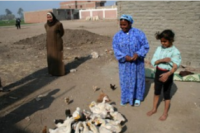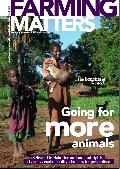
The woman and daughter in this photo live in Fayoum governorate in Egypt. This is one of the most densely populated countries in Africa, which is why many people keep their poultry on the roofs of their houses.
This woman used to earn a considerable share of the total household income by selling live birds and eggs. But since February 2006, when Egypt experienced one of the worst outbreaks of avian influenza outside Asia, things have changed. In an effort to limit the spread of HPAI and the risk of human infection, 30 million birds have been culled.
This has had a strong negative impact on the livelihoods of the poorest rural households, particularly female-headed households. Money made by selling eggs and meat used to pay for such things as food and other household necessities, in addition to medical treatment and school fees.
Many families do not have the capital to start again, in fact, they are still paying off the debt they incurred when first buying their birds on credit.
Together with the rising food prices of 2008, avian flu has caused a change in the diet of many poor people. Animal protein has been exchanged for lentils and beans.
Up till now, Egypt continues to experience outbreaks of HPAI. It is now considered one of the few countries, together with countries like Bangladesh, China and Indonesia, where the disease is endemic.
Author
Ellen Geerlings (ellengeerlings@hotmail.com) is part of the Livestock Development Group at the University of Reading. She has combined her work with her passion for photography, resulting in a publication called “People and livestock”. Some of the photos in this issue are from this publication. For more photos, see www.blurb.com/bookstore/detail/797190.


